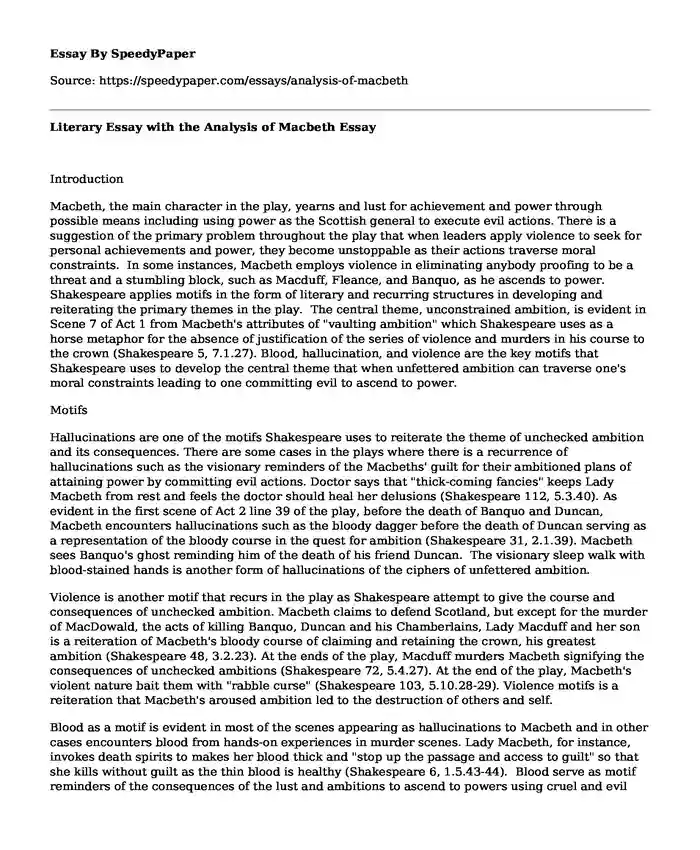
| Type of paper: | Essay |
| Categories: | Literature Analysis Shakespeare Macbeth |
| Pages: | 3 |
| Wordcount: | 691 words |
Introduction
Macbeth, the main character in the play, yearns and lust for achievement and power through possible means including using power as the Scottish general to execute evil actions. There is a suggestion of the primary problem throughout the play that when leaders apply violence to seek for personal achievements and power, they become unstoppable as their actions traverse moral constraints. In some instances, Macbeth employs violence in eliminating anybody proofing to be a threat and a stumbling block, such as Macduff, Fleance, and Banquo, as he ascends to power. Shakespeare applies motifs in the form of literary and recurring structures in developing and reiterating the primary themes in the play. The central theme, unconstrained ambition, is evident in Scene 7 of Act 1 from Macbeth's attributes of "vaulting ambition" which Shakespeare uses as a horse metaphor for the absence of justification of the series of violence and murders in his course to the crown (Shakespeare 5, 7.1.27). Blood, hallucination, and violence are the key motifs that Shakespeare uses to develop the central theme that when unfettered ambition can traverse one's moral constraints leading to one committing evil to ascend to power.
Motifs
Hallucinations are one of the motifs Shakespeare uses to reiterate the theme of unchecked ambition and its consequences. There are some cases in the plays where there is a recurrence of hallucinations such as the visionary reminders of the Macbeths' guilt for their ambitioned plans of attaining power by committing evil actions. Doctor says that "thick-coming fancies" keeps Lady Macbeth from rest and feels the doctor should heal her delusions (Shakespeare 112, 5.3.40). As evident in the first scene of Act 2 line 39 of the play, before the death of Banquo and Duncan, Macbeth encounters hallucinations such as the bloody dagger before the death of Duncan serving as a representation of the bloody course in the quest for ambition (Shakespeare 31, 2.1.39). Macbeth sees Banquo's ghost reminding him of the death of his friend Duncan. The visionary sleep walk with blood-stained hands is another form of hallucinations of the ciphers of unfettered ambition.
Violence is another motif that recurs in the play as Shakespeare attempt to give the course and consequences of unchecked ambition. Macbeth claims to defend Scotland, but except for the murder of MacDowald, the acts of killing Banquo, Duncan and his Chamberlains, Lady Macduff and her son is a reiteration of Macbeth's bloody course of claiming and retaining the crown, his greatest ambition (Shakespeare 48, 3.2.23). At the ends of the play, Macduff murders Macbeth signifying the consequences of unchecked ambitions (Shakespeare 72, 5.4.27). At the end of the play, Macbeth's violent nature bait them with "rabble curse" (Shakespeare 103, 5.10.28-29). Violence motifs is a reiteration that Macbeth's aroused ambition led to the destruction of others and self.
Blood as a motif is evident in most of the scenes appearing as hallucinations to Macbeth and in other cases encounters blood from hands-on experiences in murder scenes. Lady Macbeth, for instance, invokes death spirits to makes her blood thick and "stop up the passage and access to guilt" so that she kills without guilt as the thin blood is healthy (Shakespeare 6, 1.5.43-44). Blood serve as motif reminders of the consequences of the lust and ambitions to ascend to powers using cruel and evil means. Blood also represent the remorse and guilt lingering Macbeth's mind as part of the consequences of the adverse actions. As a reiteration of remorse and guilt, Macbeth at one instance wonders that the Neptune's water was not enough to clean blood in his hand (Shakespeare 41, 2.2.58-59). Shakespeare uses blood to symbolize Macbeth's guilt for the application of barefaced power to seek and hold on to power.
Conclusion
It is evident that blood, violence, and hallucinations are key motifs for the development of the theme of unfettered ambition when lust for power forces leaders to depart from the course of moral politics. Shakespeare uses the motifs to demonstrate how greed and unconstrained ambition transcend morality and surpass human nature. Therefore, unfettered ambition can traverse an individual's moral constraints leading to one committing evil to ascend to power.
Works Cited
Shakespeare, William. Macbeth. Prince Frederick, MD: Recorded Books, Inc., 2008. Print.
Cite this page
Literary Essay with the Analysis of Macbeth. (2018, Jan 03). Retrieved from https://speedypaper.com/essays/analysis-of-macbeth
Request Removal
If you are the original author of this essay and no longer wish to have it published on the SpeedyPaper website, please click below to request its removal:
- History of Gun Laws in Colorado - Essay Sample for Students
- Free Essay Sample on the Software Development Methodology
- Nestle Essay Example
- Christian Theology Essay Example
- Critical Response and Review
- Essay Sample: How My Knowledge, Skills, and Abilities Improved During the Session
- Paper Example on Existential Psychology and Logotherapy
Popular categories




